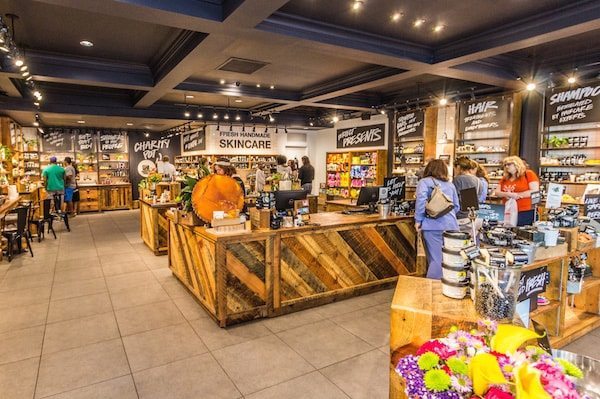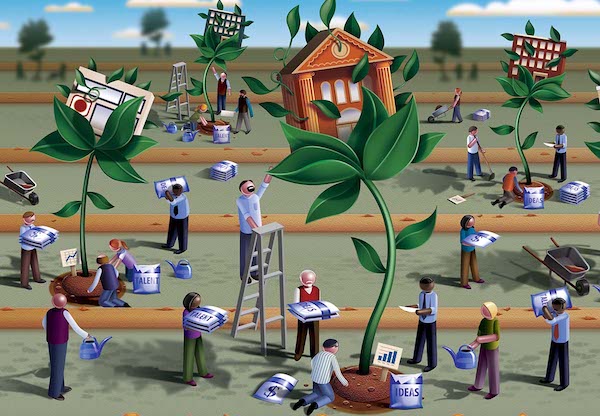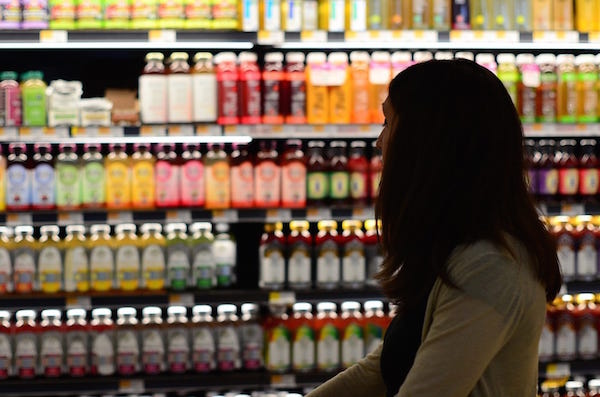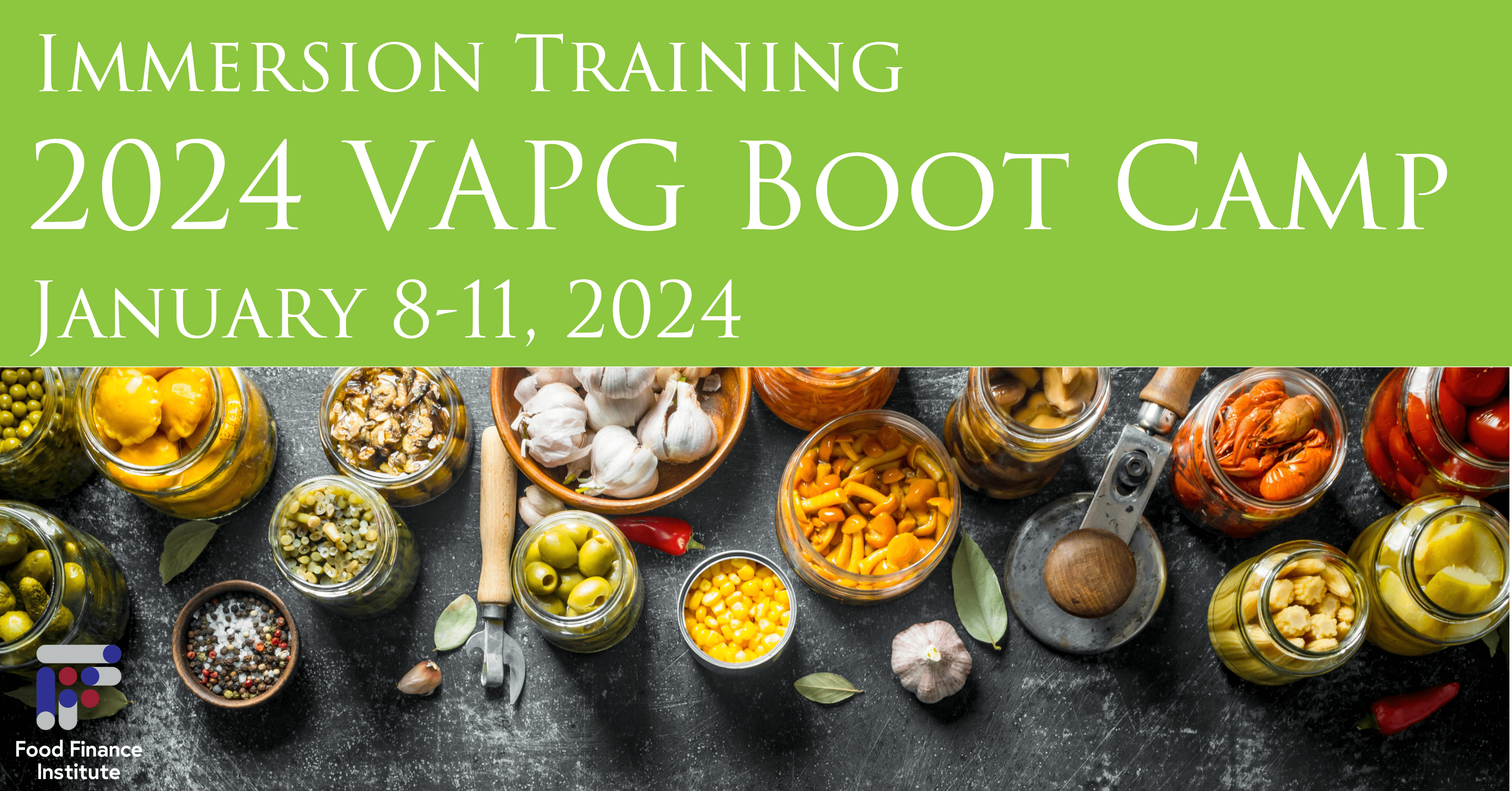Economic Gardening, from the Edward Lowe Foundation
While food businesses are developing their big, brilliant idea (and hopefully executing on it), it can be easy to forget that they are one actor in a larger entrepreneurial ecosystem. This ecosystem includes other entrepreneurs, suppliers, farmers, co-packers, funders, accelerators, incubators, consultants, retailers and consumers.
Some actors in the ecosystem, like Amazon, have an outsized influence in the marketplace because of their size and the nature of their business model, causing some brands to rethink how they relate to and get their products to their target consumers. Consumers, en masse, have been demanding healthier, more transparently produced food and that has caused large food companies to acquire brands and retool their supply chains, affecting all of the actors along the chain.
Different funders of the food entrepreneur ecosystem work with certain parts of that ecosystem. For example, some investors only work with rapidly accelerating national brands, using their capital to grow the top line sales of the company for an exit so they can recover their money with a premium. Their time horizon might be different than an established food company looking to innovate through acquisition of a portfolio of brands that they can leverage for the long term.
What stage a food business is at can affect the actors in the ecosystem food businesses might interact with. For businesses that are just starting out, visiting their local SBDC consultant or SCORE mentor for help honing their business model might be a better move than immediately going out and seeking investment from funders. Having some sales and an idea of their target customer might precede participating in an accelerator, which might then lead to more connections with other actors in the ecosystem.
Different funders often expect other sources of capital – for example, an owner’s investment as “skin in the game” – to be present in some form before investing, lending or granting money. As Jim Gage points out on our podcast this week, Value-Added Producer Grants (VAPG) are never the main source of financing for farm businesses but rather incentivize farm entrepreneurs to show prospects for expanded sales and future investment before applying. In other words, the grant application process causes these businesses to consider that they will interact with other people in the ecosystem, including other funders, and that these connections are essential to the success of the business.
To come up with a realistic strategy for action and growth, food entrepreneurs should make efforts to understand this entrepreneurial ecosystem and whether grants, loans, investments or a combination of capital sources makes sense to fund their growth. Only then can food entrepreneurs plant the seeds for a profitable and sustainable food business.
And now, our roundup of the best food and beverage finance news, events and resources from around the web…
Business Model Insights
- The educated assortment: Why data pays off at retail (New Hope Media) – “Today’s consumers constantly vary what they buy, and where, when and why they buy it. Data can help retailers focus on reaching their customers and improving sales. The days of winning shoppers by offering basic price promotions on big brands are over. Successful retailers will instead build their value proposition around what today’s consumers value: products that reduce stress or time investment; products that promise to enhance health and wellness; products with an impact on the greater good; and the treasure-hunt excitement of discovering new products.”
- From the Warehouse: 5 Lessons I Didn’t Learn in Business School (New Venture Advisors LLC)
- You Can’t Save The World if You Can’t Sustain Your Business (Intertwine Group)

Raising Capital
- The Basics of Personal Guarantees in Business Loans (Investors Community Bank) – “If you’re in the process of securing a small business loan, chances are you’ll be asked by your lender to provide a personal guarantee of that loan. A personal guarantee is an unsecured, written promise from the business owner pledging personal payment on the loan in the event the business itself would not be able to make payments. A personal guarantee might also be required from key company personnel – those without whom the business would not be able to operate. Since it’s unsecured, a personal guarantee is not tied to a specific asset of the owner(s).
- The bones of the perfect investor pitch (New Hope Media)
- How Love The Wild Built A National Brand For Frozen Farmed Fish (Edible-Alpha™ Podcast)
CPG/National Brands
- CPGs Are Exploring Foodtech Through Startup Incubators (The Spoon) – “There’s no shortage of news about foodtech startups and the incubators that hatch them. Of late, though, huge corporations like Kraft and General Mills are struggling to stay relevant and maintain market share. U.S. food and beverage sales for the top 25 food manufacturers declined from 66 percent in 2012 to 63 percent in 2015. It makes sense, then, that these CPGs are associating themselves with startups through foodtech accelerators and incubators. Some simply invest, while others actually run their own programs or partner with programs.”
- How to rebrand: 3 unique perspectives on process and evolution (New Hope Media)
- Velocity: How Well Your Product REALLY Sells (CPG Data Tip Sheet)

Market Trends
- Top 2018 trends for food and beverage industry businesses (RSM) – “Bold and exotic flavors, snacking and health and wellness are all at the forefront for consumer food preferences in 2018. Subscription food home delivery will also continue to evolve, keeping in mind consumers’ wishes to be part of the meal-making process with easy-to-follow recipes and healthy, fresh ingredients. Likewise, on-the-go, convenient packaging, like bowl-based choices featuring kale, quinoa and more, will be in demand as eager consumers look for quick but healthy eating options. As we witnessed in 2017, large packaged food companies that haven’t been on-trend with healthy snacking resulted in declining sales.”
- Could dairy standards of identity make any difference for plant-based alternatives? (FoodDive)
- Online, subscription, wholesale & the quest for value: Analyst explores the changing retail landscape (FoodNavigator-USA)
Farming and AgTech
- What is my Ag Lender Looking for? (Compeer Financial) – “Questions used to evaluate an applicant’s character range from subjective questions about their community involvement to more objective considerations, such as payment history. Other questions include: What do your financial trends say about your business? Are you showing a trend of profitability and net worth growth? Can you explain what is going on in your business? Do you have a monthly cash flow plan?”
- The Savory Institute’s Land To Market Verification aims to regenerate 1bn hectares of land (FoodNavigator-USA)
- The state of the organic industry in 2018 (New Hope Media)

Deals/M&A
- Hungry for Innovation, Big Food Firms Seek Alliances With Startups (Xconomy) – “Big Food is getting serious about innovation. Many top food companies are increasingly pumping money into supporting young, innovative startups, according to a recent analysis by CB Insights. They’re not targeting innovation just for innovation’s sake, either: The top 25 food manufacturers in the U.S. have seen sales decline from 2012 to 2015, according to a report by AT Kearny. This slide has occurred as mid-sized and small competitors are seeing double-digit growth.”
- Big Food’s Deal Frenzy Is Just Getting Started (Bloomberg)
- Hungry for Investment: Big Food Races Toward Startups (CB Insights)
Industry Events
- Farm Law Focus Session: Business Structures, Sales, Employment (Farm Commons) – Free, 4/13 online
- Optimizing Business Models for Profitability & Growth (Food Finance Institute) – $, 4/19 – 4/20 in Saint Paul, MN
- Fearless Farm Finances Workshop (MOSES) – $, 4/27 in Wisconsin Dells, WI
- Farm Law Focus Session: Land, Events, and Value-Added Production (Farm Commons) – Free, 4/28 online
- Nutrition Capital Network Spring Investor Meeting (NCN) – $, 5/9 – 5/10 in New York, NY
- Food Funded (Slow Money California) – $, 5/24 in San Francisco, CA
- Furthering Food Safety Workshop (UW-Stout) – $, 5/24 – 5/26 in Menomonie, WI
- Project Nosh Pitch Slam (Project Nosh) – $, 6/4 – 6/5 in New York, NY
- BevNet Live (BevNet) – $, 6/6 – 6/7 in New York, NY
- Smart Food Expo (Various Orgs) – $, 6/25 – 6/27 in Chicago, IL
- Expo East (New Hope Media) – $, 9/12 – 9/15 in Baltimore, MD
- Esca Bona (New Hope Media) – $, 10/22 – 10/23 in Austin, TX





